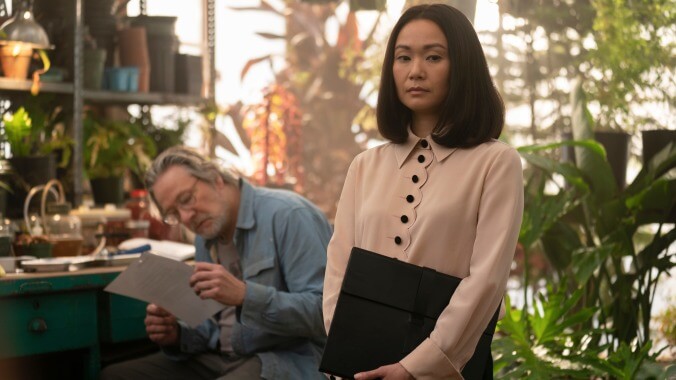Homecoming goes back in time to give Hong Chau’s determined employee a plan


Audrey Temple is both more and less clever than it seemed. Yes, she managed to vault from answering the phones at Geist all the way to one of the most senior management positions in the course of a single day; that power play required confidence, resourcefulness, brains, and the willingness to be a little flexible with the ethics of the situation. But none of it would’ve happened were it not for Alex. Audrey’s significant other pushed her into this gray area of corporate maneuvering, convincing the otherwise earnest and forthright employee that some manipulations and deceit would be worth it in the long run. It looks like Alex was right.
Going back in time to the end of season one, “Previously” shines a light on how we got from there to here, and in so doing, reveals some fascinating details about the characters of Leonard Geist, Audrey Temple, and Alex Eastman—at least, the Alex who existed before her entire memory was wiped and she woke up in a rowboat. Each one of these people turns out to contain layers that have been covered until now, aspects of their personalities that paint them as more complex than simply heroes or villains. The episode takes place over the course of no more than roughly 24 hours, but in that time, Audrey’s entire professional life receives a massive upgrade. And the life of Walter Cruz gets notably more complicated.
Alex turns out to be far less noble than previously imagined. She’s essentially a fixer, a corporate tool willing to lie, cheat, and do whatever else is necessary to shield her elite clientele from lawsuits, bad press, anything and everything that could bring harm to them or their reputations. (The opening sequence, in which she pretends to be on the side of a woman who had been sexually harassed, only to subsequently reveal she was working for the man accused of the act, really doesn’t paint her in a very good light.) She later describes her role to a potential client as that of a “prophylactic,” meant to protect them from harm. But her home life is anything but brusque; Audrey and Alex share an easy intimacy, albeit one that seems to periodically suffer from the expectations Alex places on her less-successful partner. It’s understandable, then, that when Alex sees a chance to place Audrey into her dream job, she all but manually pushes her into position. It’s fascinating to watch Janelle Monae slip into this less likable but far more complex role, imbuing then-Alex with an air of superiority and iciness at odds with the wide-eyed and uncertain amnesiac she is in the present. It’s the first time we’ve gotten some depth and nuance, and it’s a richly textured performance, especially in contrast with the other version of her.
Audrey, as a fascinating counterbalance to Alex’s Machiavellian manipulator, is practically fey in her earnest likability. She’s just trying to get ahead, doing whatever she can to prove her worth to a company that hasn’t shown any interest in helping her get ahead. (The other woman who takes her ideas to the planning meeting without so much as an acknowledgement of the exploitative dynamic, is an especially good and galling touch.) And even after she’s steeled herself and managed to convince Colin that he’ll be looked on favorably by Geist if he signs the confession and resigns, there are moments when Audrey’s un-prepossessing nature almost undoes the whole thing. When she ventures into Leonard’s greenhouse for the first time, holding the confession and hoping to convince the boss that she should take over Colin’s post, she’s struck dumb by the intensity of the moments. Awkward seconds tick by before she launches into her prepared remarks, and even then, she’s almost saved by the abruptness with which the CEO reveals his lack of awareness about everything that’s been happening. “What the fuck is ‘Homecoming?’” he asks her, and that initial ignorance rebounds doubly in her favor when Leonard ends up firing not only Colin, but Ron as well, installing Audrey as the new point person responsible for dealing with the Department of Defense investigation and taking over the high-level operations that open up as a result of the fallout from this fiasco.
Leonard Geist’s innocence might be the most surprising aspect of the entire episode. We’re so conditioned to think of CEOs as the ones ready to commit crimes in the name of boosting profits (with good reason), it’s unusual to find one who not only isn’t aware of the malfeasance taking place under his watch, but who instantly dispenses justice, firing the men responsible and installing the woman who brought it to his attention in their place. When Audrey first enters the greenhouse, he’s intentionally burning his own arm with a flame, just so her can test the efficacy of a new salve his researchers are developing. Between this and last week’s rambling speech trying to warn his employees of the people they’re doing business with, there seems to be an idealistic, or at least morally upright, core to the head of Geist. He doesn’t want any part of the Homecoming project, and he doesn’t want to deal with shady business partners. How he managed to build a massively successfully corporation with such instincts is beyond me, but it helps lend even more ambiguity to the story, preventing Geist from being some monolithic source of evil.
It’s such fun watching Audrey carry out her and Alex’s plan, it’s almost a shock to realize there’s still nearly 10 minutes left in the episode. But returning to Walter gives us the chance to see how he’s become mixed up in this situation once more, when he seemed free and clear of Geist by the end of season one. Exactly what Heidi worried might happen starts to happen: Driving home, Walter suddenly starts experiencing flashbacks, nearly running into another car and then hitting a stop sign. The visit to the doctor destroys his mother’s cover story, when the physician reveals that there’s no scar on the back of his head, putting the lie to the “head injury” narrative his mother had supplied. Something tells me the flashbacks are just beginning.
This was a great blend of the ‘70s camerawork aesthetic of season one and the more retro pleasures of the first two episodes this year, utilizing the episode-long flashback to combine the two, to excellent results. This script similarly blends dual goals, illuminating the past while also shining a light on aspects of the present mystery. We’re almost at the halfway point, and Homecoming is keeping its story humming along nicely. There are questions aplenty, but I have no doubts the show is eager to supply the answers.
Stray observations
- Bobby Cannavale returns for a guest appearance to remind everyone there’s almost no one better at portraying a character receiving a comeuppance: “So, you’re like a ‘good person,’ is that the idea?” Colin sneeringly asks Audrey. “Your shoe’s untied,” she replies without looking back.
- Well done, Homecoming, for subverting expectations on the personalities of all these characters. Chris Cooper’s do-gooder Leonard might be my favorite of the three.
- Baseless speculation corner: My idea of Alex as some anti-corruption crusader of a journalist could not have been more off the mark, so let’s revise the idea of how she wound up memory-wiped: I think Audrey “hires” her to take care of Geist’s problem—i.e. deal with Walter. Instead, maybe Walter dealt with her.
- Also nice to see Fran Kranz return as Ron, especially when he tries to give Audrey the nickname “AT&T.”
- I guess now we know what towel Alex is remembering. They’re decorative only, and get used twice here.
- Geist’s DoD contact is plenty spooked about the impending investigation. “Get a lawyer, lose my number.”
- Alex disapproves of Audrey’s drug use, but our new replacement for Ron (shouldn’t she get his parking spot and office, not Colin’s? I guess that wouldn’t have resonated as much) swears topical use is perfectly safe.